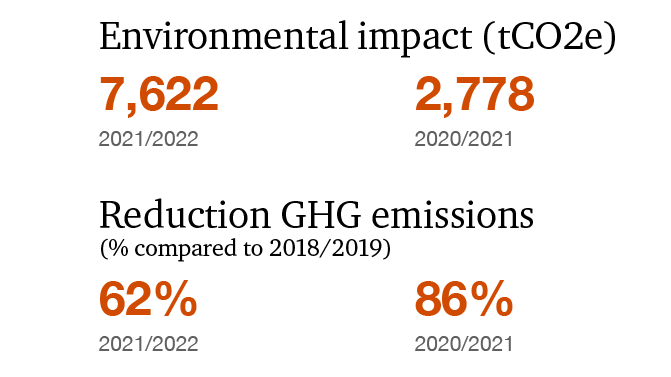
Creating long-term value
The world is facing major challenges in terms of climate, biodiversity and equality. It is essential that we work together if we are to keep our planet liveable for future generations. The business community cannot lag behind and that obviously includes PwC. As an accountancy firm, we play an increasing role in advising on ‘green figures’.


Decisive role for ESG
Organisations who wish to remain relevant in the future need to ensure that their impact on people, environment and society is a positive one, and to report transparently on that impact. ESG (environmental, social, and governance) plays a decisive role in this.
Success is only possible if we work together and if organisations make the United Nations’ seventeen sustainable development goals an integral part of their strategy. This is a crucial condition both for retaining and creating value, and therefore for business success. Without a sustainable business model, an organisation's long-term relevance decreases significantly. While everyone used to turn to governments and NGOs, it's now up to all of us to shoulder responsibility for meeting those challenges.
Being transparent about what we do
We realise that PwC can play an important role in this process, both via our own activities and through the work we do for and with our clients. It means that we actually do what we tell the outside world to do and ‘walk the talk’.
To ensure that our impact is not just positive but also significant, we are focusing on the COP26 priorities. At the UN climate summit in Glasgow in early November 2021, the members present designated climate, biodiversity and equality as focus areas.
To stay relevant ourselves and increase our social and environmental impact, PwC views sustainability from three perspectives:
- the impact of our activities;
- the impact of our people and their behaviour; and
- the impact of the services we provide.
To underline the importance of sustainability to PwC as a firm, we launched a mandatory four-hour ESG upskilling programme this year. This uses a mix of theory and practice to equip our colleagues so they are aware of ESG considerations and address them in their day-to-day work.
Becoming sustainable ourselves
In order to contribute to the fight against climate change, we aim to operate completely net zero by 2030. This involves reducing our absolute emissions (including our mobility footprint), then offsetting the remainder needed to get down to net zero by, among other things, having new forests planted which remove CO2 from the air. We also work with our suppliers to help them address their own climate impact.
Our carbon footprint is currently most heavily influenced by our mobility: the journeys we make to meet and collaborate with each other and our clients and stakeholders. The pandemic has taught us that it isn't always necessary to actually meet physically.
Compared to our 2018/2019 pre-Covid financial year, the reduction in our GHG emissions last year was 62%, while our environmental impact was 7,622 tCo2e.

Creating awareness
The Environmental Footprint Insights (EFI) tool helps ensure awareness among PwC staff before they decide to drive or take the plane. We launched this tool within our own organisation and are also offering it to clients to help them reduce their emissions. We’ve also introduced a policy on business travel, especially by air. If we need to go to Paris or Frankfurt, for example, we take the train.
PwC is part of an initiative to accelerate the supply and use of sustainable aviation fuel. United with other companies, airlines and airports in the World Economic Forum's Clean Skies for Tomorrow Coalition, we aim to ensure that at least 10% of the global supply of jet fuel is renewable by 2030. Our company is taking the lead in this and we switched in 2022 to using 100% sustainable aviation fuel for all business air travel.
Measuring our impact on the SDGs
We’ve developed an SDG Impact Measurement (IM) method to help us understand what value we create for our stakeholders in both the short and long term. This supports our value creation process by quantifying our impact along the lines of the SDGs, with the overarching aim of contributing to our purpose.
The SDG IM method covers the nine SDGs we consider most relevant, with an additional emphasis on the following four SDGs that correspond to our most relevant impact areas: SDG 5: Gender equality; SDG 8: Decent work and economic growth; SDG 10: Reduced inequalities; and SDG 13: Climate action. Long-term aims and short-term targets have been set for these four SDGs and our Annual Report explains the results achieved over the course of the past year.























